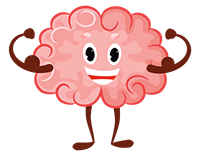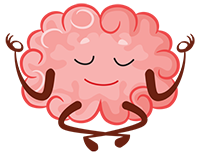
The science behind
The Super Journal
Our amazing brain: The story of neuroplasticity
Neuroplasticity is the brain’s ability to change. All humans, at every age, have the ability to relearn, rewire, and strengthen and heal important neural connections both structurally and functionally. That means the human brain can move functions from one part of the brain that is damaged to another part of the brain that is healthy and that the brain can also change its physical structure as the result of learning!
What does neuroplasticity have to do with the Kids Super Journal? Science has researched mindfulness practices and journaling and found that both are effective in fostering growth, change, and healing in the brain which is an essential element of wellbeing and overall health. When mindfulness practices like meditation, breath-work, and mindful movement are combined with journaling, these benefits are amplified. And that’s super! (see: verywellmind.com and edutopia.org)
Benefits of Journal Writing
Journal writing, also known as expressive writing, has become popular everywhere from classrooms to boardrooms. Mainstream sources from the New York Times to Forbes Magazine are disseminating the science-based benefits of journal-writing studies to mainstream America and with good reason. Journal writing can:
Improve engagement and meaning in the classroom
Improve working memory and cognitive functioning
Increase self-regulation and boost mood
Changes grey matter in the brain
Improve symptoms of PTSD
Foster the ability to find meaning in trauma and create positive life changes after a traumatic event
Decreases rumination and promote action
Reduce stress and anxiety
Strengthen the immune system
Promote self-awareness
Reduce symptoms of depression
Reduce physical symptoms related to health issues
Amplify the benefits derived from a mindfulness practice like meditation
These benefits apply to anyone who can write – children, teens, college students, adults, and seniors. Perhaps most salient for children is the fact that expressive writing has proven effective in increasing self-efficacy and promoting a healthy sense of control over one’s life—a vital area of child and adolescent development (Fritson, 2008).
Children additionally gain these benefits from journal writing:
Healthy, safe outlet to deal with “big feelings”
Improve writing and reading skills
Enhance verbal and written communication skills
Provide a safe outlet for feelings or thoughts that are challenging or uncomfortable to express
Learn to identify and explore their emotions, especially “taboo” emotions like anger or hopelessness
See both positives as well as negatives
Gain insight into their motives and the motives of others
Plan out difficult conversations in advance (Morin, 2018, Rodriguez 2017)
Science has discovered that the expressive writing process requires our left brain—the analytical, rational side—to engage. This reduces intrusive and avoidant thoughts about negative experiences which frees up the right brain—the creative, emotional, intuitive side—for other mental activities, including our ability to cope more effectively with stress (APA Journal of Experimental Psychology; Vol. 130, No. 3) The expansion of creativity and emotional capacity can be cathartic and improve daily wellbeing (Grothaus, 2015).
-
Zindel Segal, Distinguished Professor of Psychology in Mood Disorders at the University of Toronto and pioneering specialist in treating mood disorders with mindfulness says, “the very act of writing takes information that is often only dimly perceived—such as quick judgments, fears, worries—and concretizes them by putting them in written form on paper. It requires that they are formed in language and also, once seen ‘on the page’ they may be experienced with less of an emotional charge than when they are in the head.” This frees the mind from rumination and develops curiosity around events and emotions instead of worry and fear. This in turn relaxes the nervous system and the whole process, over time, becomes a natural way of managing and connecting to all life events, feelings, triumphs, and challenges.
Additionally, the process of writing by hand increases neural activity in certain sections of the brain similar to meditation. According to neuroscientist Dr. Laudia Aguirre, “This sharpens the brain’s gray matter, helps us learn, and influences us to think more positively. “Mindful writing rests the brain, potentially sparking creativity,” she says.
Meditation and Mindfulness Practices
The science-based benefits of secular meditation (described as modern mindfulness using a variety meditation techniques derived from religious practices but having no religious or spiritual focus) are well established. Secular meditation has been adopted in a variety of forms, including use in the classroom. Secular meditation techniques include guided visualization, mindfulness meditation, body scan, breathing techniques, walking meditation, loving-kindness meditation, mindful-movement like yoga, and others. Some of the scientifically documented benefits of secular meditation include:
Controlling anxiety, worry, and rumination
Promoting emotional health and resiliency
Enhancing self-awareness
Improving focus and lengthens attention span
May reduce age-related memory loss
Can generate kindness and thoughtful action
May help fight addictions
Improving sleep
Helping control pain
Decreasing blood pressure and increasing other forms of physical health
Journal Writing and Childhood Traumas, Covid-19 Pandemic
No matter what a child’s environmental stressors were before March of 2020, added to every child’s life experience has been the Covid-19 pandemic. This unprecedented world event has created for children multiple levels of loss and dramatic change. According to the CDC, children are faced with the following challenges resulting from the pandemic:
Changes in their routines such as having to physically distance from family, friends, and their worship community
Breaks in continuity of learning with virtual learning environments, variation in technology access and connectivity issues
Breaks in continuity of health care through missing wellness visits, missing receiving immunizations, limited access to mental, speech, and occupational health services and other special services.
Missed significant life events such as graduations and birthdays, lost travel and school field trips, and missing milestone life events like weddings
Lost security and safety such as housing and food insecurity, parents losing work and income, increased exposure to violence and online harms, threat of physical illness and uncertainty for the future
We at the Kids Super Journal feel a responsibility to support our youngest generation in any way possible. The Kids Super Journal is choosing to be a leader in providing healing tools to help children build resiliency, process grief, and recover trust no matter where they live or what economic circumstances they live in.
Dr. James W. Pennebaker, a social psychologist at the University of Texas at Austin, says “expressive writing (journaling) helps us organize our minds and make sense of trauma. This improves memory so our brains are freed from the enormously taxing job or processing the trauma. We sleep better which improves mood, immune system function, and social interaction.”
-
Additional studies have found that writing enables children to process enormous loss and reduce the most severe symptoms of grief. This has been proven to be especially effective for children dealing with bereavement (Kalantari, Yule, Dyregrov, Neshatdoost, & Ahmadi, 2012).
The CDC adds that, “to achieve health equity, barriers must be removed so that everyone has a fair opportunity to be as healthy as possible.” The Kids Super Journal offers all children an inexpensive and portable process that can be utilized at any time, by any child, no matter their race, ethnicity, background, or access to quality education or healthcare. Any child who can write or draw can practice journaling as a mindful tool for showing up for themselves and their emotions in their own way and in their own world. Pennebaker is quoted in the New York Times saying, “Journaling can be one of the most useful and cost-effective tools we have to forge a better, more emotionally and mentally healthy life.”
In the wake of the profound effects of the Covid-19 pandemic, the increasingly stressful demands of our global world, and individual traumas so many children live with, this simple and effective mindfulness and journaling tool is a meaningful, accessible, and much needed process for kids to develop agency in their healing and in their mental, emotional, and physical health.




